News
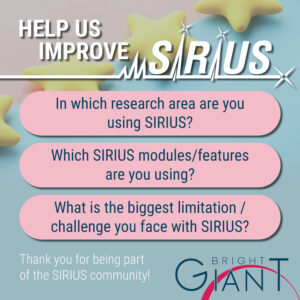
Help us improve SIRIUS!
We've launched a quick user survey to hear directly from you about how you're using SIRIUS, its impact on your work, and the challenges you'd love to see solved.
Your insights will influence upcoming features and improvements.
Your insights will influence upcoming features and improvements.
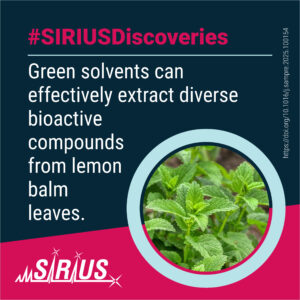
#SIRIUSDiscoveries
A recent study investigated 20 different Natural Deep Eutectic Solvents (NADES) – a class of green, biodegradable solvents – for extracting bioactive molecules from lemon balm. SIRIUS usage resulted in the putative annotation of 444 metabolites from the plant extracts. The researchers identified several known bioactive compounds that had never before been described in lemon balm, effectively expanding the known chemical space of this medicinal plant.
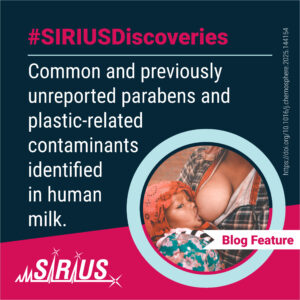
#SIRIUSDiscoveries
Human milk is a primary source of nutrition for infants, but it can also contain chemical contaminants from the environment, food, and personal care products.
A recent study analyzed 594 human milk samples and identified a wide range of contaminants using SIRIUS for structure elucidation.
The non-targeted approach identified four previously unreported parabens, as well as phthalate metabolites, PFAS, UV filters, and synthetic antioxidants.
The non-targeted approach identified four previously unreported parabens, as well as phthalate metabolites, PFAS, UV filters, and synthetic antioxidants.
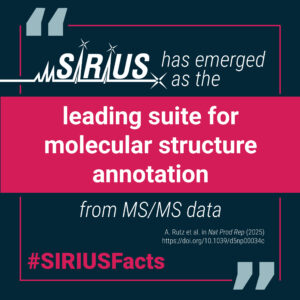
Leading for structure annotation
🥇 SIRIUS has emerged as the leading suite for molecular structure annotation from MS/MS data
A recent review on mass spectrometry-based metabolomics for natural product research positions SIRIUS as the leading suite for molecular structure annotation, because of its comprehensive and modular design, its proven ability to handle large-scale analyses, and its integration of multiple powerful subtools that address various aspects of annotation.
A recent review on mass spectrometry-based metabolomics for natural product research positions SIRIUS as the leading suite for molecular structure annotation, because of its comprehensive and modular design, its proven ability to handle large-scale analyses, and its integration of multiple powerful subtools that address various aspects of annotation.
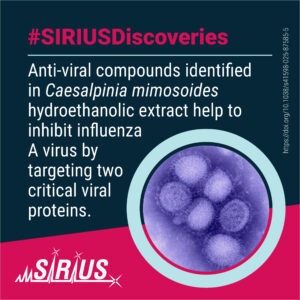
#SIRIUSDiscoveries
Anti-viral hydroethanolic extract of the plant Caesalpinia mimosoides is 3.35 times more effective against the influenza A virus than its traditional aqueous counterpart. Researchers at Khon Kaen University, Thailand, used SIRIUS to annotate the diverse range of bioactive compounds in this extract and showed that the identified compounds likely help to inhibit influenza A virus by targeting two critical viral proteins.
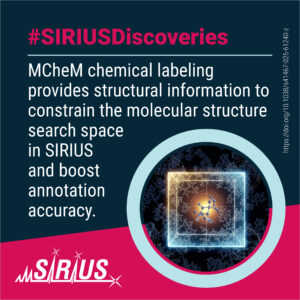
How To | Chemical Labeling
Constraining the molecular structure search space with chemical labeling: New workflow to address the chemical 'dark matter'. Multiplexed Chemical Metabolomics (MCheM), integrates online chemical labeling reactions directly into the LC-MS/MS workflow. This provides crucial structural information which is fed into SIRIUS to significantly constrain the molecular structure search space and boost annotation accuracy.

How To | Structure Sketcher
Do you ever look at the best hit from a structure database search and instantly know how to improve it?
In SIRIUS, your chemical intuition just got a powerful new tool: the Structure Sketcher. This new tool empowers you to manually refine and modify candidate structures, turning initial hypotheses into high-confidence annotations. It's the perfect way to apply your expertise and improve your results.
Learn how to use the Structure Sketcher in our new tutorial.
Learn how to use the Structure Sketcher in our new tutorial.

1 billion processed queries
We're blown away by the growth of the SIRIUS community! The demand for accurate small molecule identification is accelerating, and we're seeing unprecedented usage and impact of our software across the globe. Thank you for being part of this journey.

SIRIUS 5 | End of life
Important Announcement for SIRIUS 5 Users: Please be aware that maintenance and support for SIRIUS 5 will officially end on February 28, 2026.
To ensure you continue to benefit from the latest advancements in small molecule identification from mass spectrometry data, we highly recommend upgrading to SIRIUS 6.
To ensure you continue to benefit from the latest advancements in small molecule identification from mass spectrometry data, we highly recommend upgrading to SIRIUS 6.

SIRIUS v6.3 is here
We're excited to introduce the latest version of SIRIUS with powerful new features (v6.2/6.3) to enhance small molecule identification:
Biotransformer 3.0 Integration | Substructure Validation via Spectral Library Analog Search | Molecular Structure sketcher | Kendrick Mass Defect (KMD) Plots for Homologous Series | Interactive Software Tour Guides | Improved Result Views
Explore the new features and elevate your mass spectrometry data analysis.
Biotransformer 3.0 Integration | Substructure Validation via Spectral Library Analog Search | Molecular Structure sketcher | Kendrick Mass Defect (KMD) Plots for Homologous Series | Interactive Software Tour Guides | Improved Result Views
Explore the new features and elevate your mass spectrometry data analysis.

Retention Time Prediction
The Böckerlab has introduced a groundbreaking two-step method that changes the game of retention time prediction. Instead of predicting retention times directly, the method predicts a Retention Order Index (ROI)—a simple ranking that reflects the order in which compounds elute. This ROI can then be mapped to retention times with ease.

#SIRIUSDiscoveries
Tattoo allergies are a growing concern as pigments in the skin are a source for allergenic transformation products. Researchers have developed an online-LC-EC-MS approach that separates pigments from impurities before simulating their metabolism, ensuring accurate assignment of transformation products. Using SIRIUS for data analysis, they have identified key transformation products that may contribute to allergic reactions.

#SIRIUSDiscoveries
A recent study showcases the role of SIRIUS for confidently annotating metabolites of high-potency synthetic opioids like nitazenes using untargeted LC-HRMS. The future of toxicology relies on highly sensitive untargeted analytical methods and the integration of Machine Learning for automated classification of novel analogues.

#SIRIUSDiscoveries
A recent study using untargeted metabolomics with liquid chromatography-tandem mass spectrometry (LC-MS/MS) and SIRIUS for classification of compounds identified specific biochemical signatures of thermal tolerance that are vertically transmitted across generations in rice corals.
This has profound implications for selecting thermally resistant stock for reef conservation and restoration efforts worldwide.
This has profound implications for selecting thermally resistant stock for reef conservation and restoration efforts worldwide.

Workshop Recap
Automated Annotation with SIRIUS 6
We had an incredible turnout, with over 80 interested (future) SIRIUS users filling the room.
We demonstrated how SIRIUS 6 is transforming small molecule annotation by going beyond traditional spectral libraries. By combining structural database searching and molecular structure generation, SIRIUS 6 offers a powerful, integrated approach to annotation. We also highlighted the seamless integration of spectral libraries for robust validation through analog searching.
It was inspiring to see such strong interest in advanced metabolomics tools. We wrapped up with a vibrant 20-minute Q&A.
Thanks to everyone who joined and engaged so actively!
We had an incredible turnout, with over 80 interested (future) SIRIUS users filling the room.
We demonstrated how SIRIUS 6 is transforming small molecule annotation by going beyond traditional spectral libraries. By combining structural database searching and molecular structure generation, SIRIUS 6 offers a powerful, integrated approach to annotation. We also highlighted the seamless integration of spectral libraries for robust validation through analog searching.
It was inspiring to see such strong interest in advanced metabolomics tools. We wrapped up with a vibrant 20-minute Q&A.
Thanks to everyone who joined and engaged so actively!

Talk at Metabolomics 2025
Novel transformation product annotation with SIRIUS
In this talk, we’ll introduce a new, transparent and interpretable workflow built into SIRIUS that combines structure generation with BioTransformer, annotation via CSI:FingerID, high-speed spectral & analog search with a novel linear-time cosine similarity algorithm and combinatorial fragmentation to annotate substructures & MS/MS peaks.
In this talk, we’ll introduce a new, transparent and interpretable workflow built into SIRIUS that combines structure generation with BioTransformer, annotation via CSI:FingerID, high-speed spectral & analog search with a novel linear-time cosine similarity algorithm and combinatorial fragmentation to annotate substructures & MS/MS peaks.

SIRIUSEvents
We’re thrilled to share our SIRIUS contributions at Metabolomics 2025 in Prague! 🇨🇿
We can’t wait to engage with the metabolomics community, share our expertise, and showcase how SIRIUS 6 is empowering more confident, comprehensive analyses.

SIRIUS Short Course Tutorial Series
We are excited to announce our new tutorials on YouTube! Whether you're a new user or looking to refresh your skills, our tutorials will guide you through the essential features of SIRIUS 6 to help you get the most out of your data.

Poster at ASMS 2025
Learn how SIRIUS empowers the annotation of transformation products, crucial for environmental monitoring, and how we're validating results with spectral library analog search.
Come by to learn more about SIRIUS and discuss how it can accelerate your research!
Come by to learn more about SIRIUS and discuss how it can accelerate your research!

Join the SIRIUS community
What began as an academic project for molecular formula identification has grown into an all-in-one software solution for small molecule identification that combines powerful structure annotation methods with multiple validation levels.
SIRIUS is widely recognized and trusted within the global scientific community, processing millions of queries each year. A huge thank you to all the users for years of collaborative development and contributions and for the trust and value you are placing in SIRIUS.
Would you like to get started or are you curious about how SIRIUS can support your work? This is a great time to get involved.
SIRIUS is widely recognized and trusted within the global scientific community, processing millions of queries each year. A huge thank you to all the users for years of collaborative development and contributions and for the trust and value you are placing in SIRIUS.
Would you like to get started or are you curious about how SIRIUS can support your work? This is a great time to get involved.
